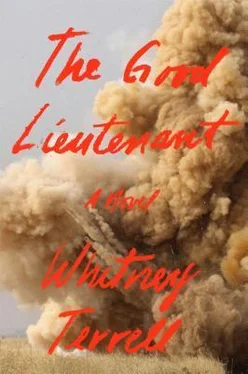Compared with the Hammermill paper on the table, Halt’s object had a surprisingly sharp color, a yellowish, phlegmy gray. Its exterior — the whole gobbet was the size of a fingertip — seemed rumpled, like a bit of coral, something that had grown in on itself, accreted, and then there were the horrifying white strings, feelers, Fowler wanted to call them, extending from a charred, frowzy skirt at the base of the main piece. Standing on her tiptoes, she scanned the intersection, the dark maw of the blast hole, the Humvees scorched to the color of tinfoil, the field of rubble beside the barracks, trying to imagine two human bodies separated into pieces as small as the one Halt had brought back. She glanced down at the insufficient white roll of Hefty trash bags in her hand.
Then Shoemaker started to cry. She was a burly, cornrowed sergeant, normally assigned to Delta Company, and she bolted, her boots crunching over the gravel that Halt had just crossed, her pie-tin ass wobbling beneath her body armor.
Colonel Seacourt and the tight, sunglasses-wearing phalanx of his personal security detail marched to the far end of the Fort Riley gym, where a stage had been hastily constructed — bare risers, three flags, a podium whose front had been covered with an office-paper printout of the 1st Battalion, 27th Infantry’s seal. A television on a metal gurney played a DVD of still photos taken during the last six weeks of the battalion’s preparations to go overseas. Shots of soldiers shackling Humvees to railcars. Shots of volleyball games. Shots of PT — all of it too far away for Pulowski to see from the back row of the bleachers, but this didn’t matter. In his opinion, the DVD was static, designed to mask the fact that he and the entire battalion were in this gym under armed guard. And they would not be allowed to leave until 1800 hours, when they departed for Iraq.
“He looks a little smug, don’t you think?” Pulowski’s mother said. “I wonder why they haven’t kept him in the gym with everybody else.”
This was exactly what Pulowski himself was thinking. “Don’t worry about him, Mom,” he said. “He’s just the battalion commander. I barely see him.”
“I guess that makes it easier to be smug, then, doesn’t it?” said his mother, yet another point with which he found it difficult to disagree.
When his boss, Major McKutcheon, talked about Colonel Seacourt in private or out at the bar in Aggieville where Pulowski and a few of the other Headquarters Company officers met after work, he referred to him as “Bucky.” Normally, this would’ve been exactly the kind of information he would’ve been happy to share with his mother, make her guess how he got the name — or at least get her opinion on whether Bucky fit as well as Pulowski thought it did, because, in a certain sense, Bucky somehow seemed to exactly capture the essence of Colonel Seacourt’s spurious and cheerful blandness. Maybe it had to do with his teeth: Bucky, as in buckteeth. That too would’ve been amusing to share with his mother, except for the fact that it was not any more reassuring than the armed MPs at the gym’s exits. As if even Bucky understood the purity of Pulowski’s desire, at this last moment, to never see Iraq. And so, as the colonel bowed his head to begin his speech with a prayer, Pulowksi shifted his eyes nervously to the rafters of the Fort Riley gym. Not much comforting up there, save some old satin banners that looked to be from the fifties and the wiring for a PA system that he could see was equally out-of-date.
Then he found Fowler on the crowded floor below him. She was on the opposite end of the gym from Seacourt’s stage, kneeling beside a pile of packed rucks that he presumed belonged to her platoon. Her head was bowed and he could see the sash of brown hair across her forehead, and then the curve of her haunch underneath her fatigues, which was about the only actually, personally reassuring thing that he saw in that entire gym. She’d been more positive on the subject of Colonel Seacourt than he’d ever been, a defender of his organizational abilities, not to mention his fairness — able to overlook what Pulowski felt to be his cloying optimism by pointing out that at least he wasn’t a screamer, or a bully, or a crook. “What are you looking at?” his mother asked.
Startled, he glanced up at his mother’s face. Their coloring was much the same, pale and paler — but the winter air of central Kansas had dried her skin, causing new wrinkles to appear at the edges of her lips. Now, for the first time, he saw a flush to her cheeks, some twinkle of amusement in her green eyes.
“Sorry?” he said. “What are you talking about?”
“That girl you’re looking at, Mr. Dixon Pulowski. Who is she?”
“I wasn’t aware that I was looking at anyone in particular,” he said. “Just spacing out.” He spun his finger beside his head to indicate mental confusion.
“Yeah, well, that’s about the most intense spacing out that I’ve ever seen.”
“I’ve been practicing,” he said.
“I’m talking about that woman, right there,” his mother said, loudly enough that the family in front of them responded with a windy, movie-theater shush.
“Mom — come on,” he whispered, thrusting a chin toward the colonel at the podium, who by then had begun his speech.
Pulowski and McKutcheon had adapted the colonel’s speech from four or five other public speeches that McKutcheon had stored on his hard drive. It had seemed standard enough work, sitting up in McKutcheon’s office, banging out transitions, trying to find language that would, according to the memo that Seacourt had sent them, cause us to appear both resolute and certain in our purpose. It is VERY IMPORTANT that these people believe their sons and daughters are heading out on a clearly defined mission that is important to protecting the security of the United States and is beneficial to the Iraqis.
Unfortunately, they’d had to take out the sections in the speech — still good only six months earlier — about protecting the country from WMDs, since the Iraq Survey Group had now delivered their finding that there hadn’t been any WMDs. They’d had to remove, by executive order from the DoD, any references connecting the invasion of Iraq to the 9/11 attacks and, given the so-called facts on the ground — including casualty reports that said the coalition forces had so far lost more than two thousand men — they’d had to strike any references to their victory in Iraq, or nation-building, or peacekeeping.
After that, there hadn’t been much left, except to focus on reconstruction projects, school-building, and the colonel’s intention to return electricity to every family in his area of operations — none of which was likely to happen, given the security intel that Pulowski had seen. Still, a bullshit speech was a bullshit speech. You wrote it and got it done. And if you knew where the bullshit was buried, as he believed he did, you could protect yourself, as he believed he had. Or at least that was how he’d felt until he listened to this speech with his mother and felt her fear and disbelief. And he realized that he had nothing better to tell her, no words that wouldn’t make her more afraid.
“We have made a commitment to freedom,” Seacourt was saying. “As a nation and as a people. The men and women that you see in this room, your sons and daughters, are a living, breathing example of that commitment.”
“Good Lord,” his mother muttered. “Who writes this dreck?”
The prayer would be coming next. Quickly, before Seacourt could say more, Pulowski bent down and unzipped the tightly packed ruck at his feet. He had bought a present for Fowler just the night before. It was … well, he wasn’t exactly sure what to call it. A token of appreciation? For what? For screwing his brains out?
Читать дальше












